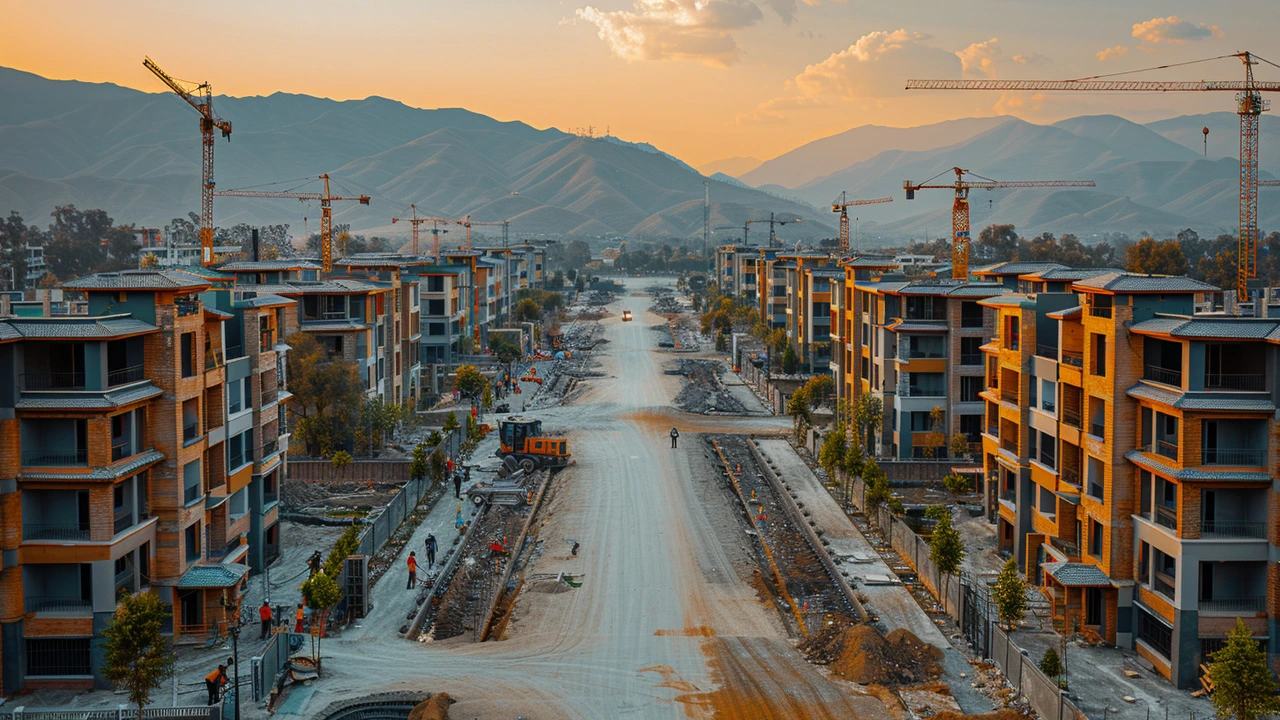The Rising Cost of Housing in Ethiopia
As I walk through the bustling streets of Addis Ababa, Ethiopia's capital city, I can't help but notice the stark contrast between the gleaming new high-rise apartments and the sprawling informal settlements that house a significant portion of the city's population. The cost of housing in Ethiopia has been on a steady rise over the past decade, making it increasingly difficult for many Ethiopians to afford a decent place to call home.
According to a recent report by the World Bank, the average price of a house in Addis Ababa is around $50,000, which is more than 50 times the average annual income of an Ethiopian household. This alarming statistic highlights the severity of the housing affordability crisis in the country.
"The housing market in Ethiopia is characterized by a significant supply-demand gap, with the demand for affordable housing far outstripping the available supply," says Yohannes Sisay, a real estate expert based in Addis Ababa.
So, what are the factors driving these high housing prices in Ethiopia? Let's take a closer look.
Population Growth and Urbanization
One of the primary reasons for the high cost of housing in Ethiopia is the country's rapid population growth and urbanization. With a population of over 110 million, Ethiopia is the second-most populous country in Africa. The urban population has been growing at a rate of around 4.5% per year, putting immense pressure on the housing market in cities like Addis Ababa.
As more people move to urban areas in search of better opportunities, the demand for housing has skyrocketed. However, the supply of affordable housing has not kept pace with this growing demand, leading to a severe shortage and driving up prices.
"The influx of people into urban areas has created a housing crisis in Ethiopia," notes Mekdes Gebre, a sociologist at Addis Ababa University. "Many low-income families are forced to live in overcrowded and substandard conditions due to the lack of affordable housing options."
Limited Land Supply and High Construction Costs
Another significant factor contributing to the high cost of housing in Ethiopia is the limited availability of land for development, particularly in urban areas. The government owns most of the land in the country, and the process of acquiring land for housing projects can be lengthy and bureaucratic.
Moreover, the cost of construction materials and labor has been on the rise, further driving up the price of housing. Ethiopia relies heavily on imported construction materials, such as cement and steel, which are subject to fluctuations in global market prices. The shortage of skilled labor in the construction industry also contributes to higher building costs.
"The combination of limited land supply and high construction costs makes it challenging for developers to build affordable housing in Ethiopia," explains Henok Assefa, a civil engineer and construction manager based in Addis Ababa.
Government Initiatives and Potential Solutions
Recognizing the severity of the housing affordability crisis, the Ethiopian government has taken steps to address the issue. In 2005, the government launched the Integrated Housing Development Program (IHDP), which aims to build 400,000 housing units across the country, with a focus on low and middle-income households.
While the IHDP has made some progress in increasing the supply of affordable housing, the scale of the problem remains immense. Experts argue that more needs to be done to tackle the root causes of the housing crisis, such as reforming land policies, investing in infrastructure, and promoting the use of alternative construction materials and technologies.
"Addressing the housing affordability crisis in Ethiopia requires a multi-faceted approach that involves collaboration between the government, private sector, and civil society," suggests Mekdes Gebre. "By working together and implementing innovative solutions, we can create a more equitable and sustainable housing market for all Ethiopians."
The Way Forward
As I reflect on the complex issues surrounding housing affordability in Ethiopia, I can't help but feel a sense of urgency. The high cost of housing is not just a matter of economics; it has far-reaching social and political implications. When large segments of the population are excluded from the housing market, it can lead to increased poverty, social unrest, and political instability.
It is clear that addressing the housing crisis in Ethiopia will require a concerted effort from all stakeholders. The government must continue to prioritize affordable housing initiatives, while also creating an enabling environment for private sector participation. Developers and investors should be encouraged to explore innovative and cost-effective building solutions, such as prefabricated housing and green building technologies.
Moreover, there is a need for greater public awareness and engagement on the issue of housing affordability. Civil society organizations and community groups can play a crucial role in advocating for the rights of low-income households and holding the government and private sector accountable.
As an individual, I believe that each of us has a role to play in creating a more equitable and sustainable housing market in Ethiopia. Whether it's supporting affordable housing initiatives, advocating for policy reforms, or simply being more mindful of our own housing choices, we can all contribute to building a future where everyone has access to a decent and affordable place to call home.
The road ahead may be challenging, but with determination, innovation, and collaboration, I am hopeful that we can overcome the housing affordability crisis in Ethiopia and create a brighter future for all.

 Is English Commonly Spoken in Ethiopia?
Is English Commonly Spoken in Ethiopia?
 High Demand Opportunities in Ethiopia: Profitable Ventures to Explore
High Demand Opportunities in Ethiopia: Profitable Ventures to Explore
 Exploring the Warmth of Ethiopia: Are Ethiopians Truly Friendly?
Exploring the Warmth of Ethiopia: Are Ethiopians Truly Friendly?
 Top Ethiopian Products: From Coffee to Pulses
Top Ethiopian Products: From Coffee to Pulses
 Making Money on YouTube in Ethiopia: A Practical Guide
Making Money on YouTube in Ethiopia: A Practical Guide
grace riehman
April 5, 2024 AT 23:03Hey folks, just wanted to share that the housing squeeze in Ethiopia kinda reminds me of the urban sprawl back home, but with way more amazing cultural vibes. It's crazy how fast Addis is growing, like everyone wants a piece of that city energy. I think we need more community driven projects that respect local traditions while tackling the price hikes. Also, informal misspelling adds a real human touch, ya know? Let's keep the convo friendly and think about how diaspora can help with skill sharing.
Vinay Upadhyay
April 6, 2024 AT 01:33Wow, another heartfelt meme, as if the grammar errors are the real crisis here. Your misspellings are charming, but they distract from the actual data, which shows a 4.5% annual urban growth rate – not a trivial number. Also, the tone is far too optimistic given the structural constraints Ethiopia faces. Perhaps focus on the numbers instead of personal anecdotes.
Eve Alice Malik
April 6, 2024 AT 04:03It's fascinating how the population boom directly fuels the housing demand. When you look at the numbers – over 110 million people nationwide and a steady 4.5% urban growth – you can see why supply just can't keep up. The land ownership model where the state controls most of the land adds another bottleneck. Plus, the reliance on imported construction materials hikes costs every time the global market shifts. All these layers make the problem far more complex than just 'not enough houses'.
Debbie Billingsley
April 6, 2024 AT 05:43While the statistics are sobering, let us not forget the pride Ethiopia holds as one of Africa's most historic nations. The rapid urbanization is a testament to our resilience and ambition. Land reforms must be crafted carefully to preserve our heritage while enabling progress. I urge policymakers to balance tradition with modern development, ensuring that new housing projects reflect our cultural identity.
Patrick Van den Berghe
April 6, 2024 AT 07:40Housing costs are up because land is scarce and building materials cost a lot.
Josephine Gardiner
April 6, 2024 AT 09:20Indeed, the scarcity of developable land, coupled with the heavy reliance on imported construction inputs, exerts considerable upward pressure on housing prices. The government's land administration procedures, while intended to ensure equitable distribution, often become protracted, thereby discouraging timely project execution. Moreover, the fiscal implications of import tariffs and fluctuating exchange rates cannot be overlooked when assessing construction cost escalations. A comprehensive policy review, focusing on both regulatory efficiency and domestic material production, would be a prudent step forward.
Jordan Fields
April 6, 2024 AT 10:26Policy reform is essential.
Divyaa Patel
April 6, 2024 AT 12:40When we peer beneath the glossy veneer of Addis Ababa's skyline, we encounter a tableau of human aspiration tangled in the thorny vines of economics, tradition, and ambition. The city's relentless expansion is not merely a statistic; it is a living, breathing narrative of families seeking dignity within four walls. Yet, each brick laid seems to demand a sacrifice of dreams, as the price tags swell beyond the reach of the average household. One must ask whether the allure of modernity is being sold at the expense of cultural cohesion, where ancient communal values risk eroding under the weight of concrete monoliths. The government's Integrated Housing Development Program, while commendable in intent, often resembles a band-aid on a wound that throbs with systemic inadequacies. Land tenure complexities, a vestige of historical governance, continue to choke the flow of development, turning potential projects into bureaucratic labyrinths. Furthermore, the relentless dependence on imported cement and steel not only inflates costs but also exposes the sector to volatile global markets, a precarious gamble for a nation striving for self-sufficiency. In the shadows of towering apartments, informal settlements persist, embodying resilience yet also highlighting stark inequality that fuels social tension. As the urban populace swells, the demand for affordable housing morphs into a seismic force that reverberates through every socioeconomic stratum. Innovation, therefore, must not be an afterthought but a clarion call: prefabricated modules, eco‑friendly materials, and community‑led building cooperatives could rewrite the script of scarcity. The private sector, oft‑criticized for profit motives, can become an ally when incentivized to align profit with public good, perhaps through tax benefits or public‑private partnerships that prioritize affordability. Civil society, too, holds a torch, amplifying the voices of those marginalized and holding authorities accountable for equitable outcomes. The path forward is neither simple nor swift, but it is illuminated by the collective will of a nation that has endured centuries of adversity. Let us, therefore, champion policies that harmonize growth with heritage, ensuring that every Ethiopian, regardless of income, can claim a space they proudly call home. Only then can the skyline of Addis truly reflect the aspirations of its people, not just the ambitions of a privileged few.
Larry Keaton
April 6, 2024 AT 14:03Yo, that's some deep stuff! I totally agree that we gotta push for prefabs and green tech – it's the only way to cut those crazy costs. Also, if private firms get proper incentives, they'll actually wanna help, not just chase profit. Let's spread the word and rally around community co‑ops, cuz real change starts at the grassroots.
Liliana Carranza
April 6, 2024 AT 16:00This issue hits close to home for many of us who watch friends struggle to find decent shelter. The government's attempts, while well‑intentioned, often stall in red tape, leaving the most vulnerable in limbo. Encouraging local material production could not only lower costs but also boost jobs, creating a virtuous cycle of development. Moreover, public awareness campaigns can empower citizens to demand transparent and accountable housing policies. By uniting NGOs, community leaders, and policymakers, we can forge a pathway toward sustainable, affordable housing for all Ethiopians.
Jeff Byrd
April 6, 2024 AT 17:40Oh great, another feel‑good rallying cry – because apparently shouting louder solves construction delays.
Joel Watson
April 6, 2024 AT 19:20The discourse surrounding Ethiopia's housing market necessitates a nuanced examination of macro‑economic variables and sociopolitical frameworks.
Chirag P
April 6, 2024 AT 21:00Indeed, a balanced and respectful dialogue is essential to dissect the complexities at play and to foster collaborative solutions.